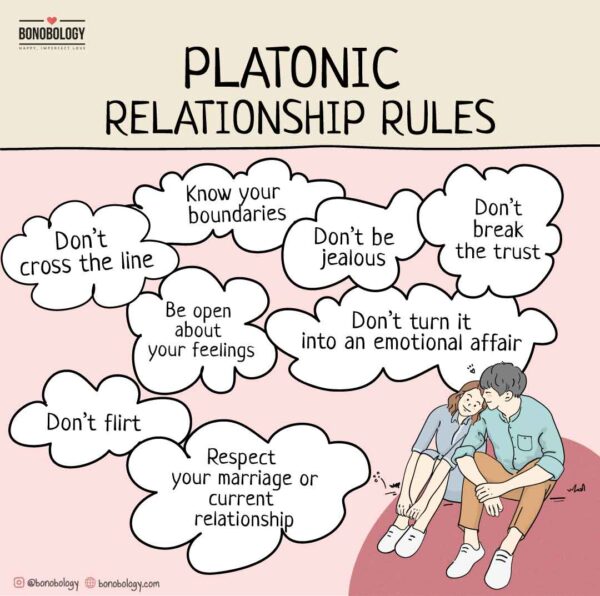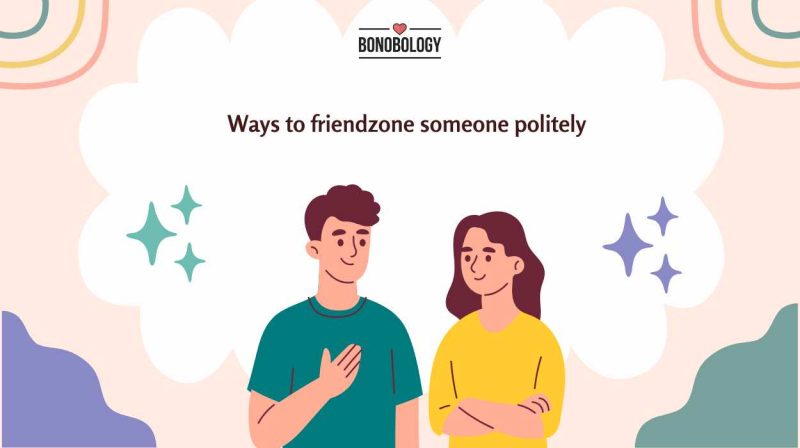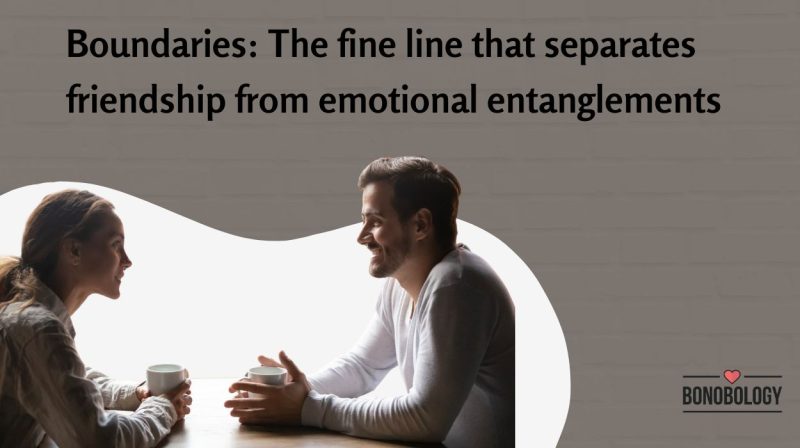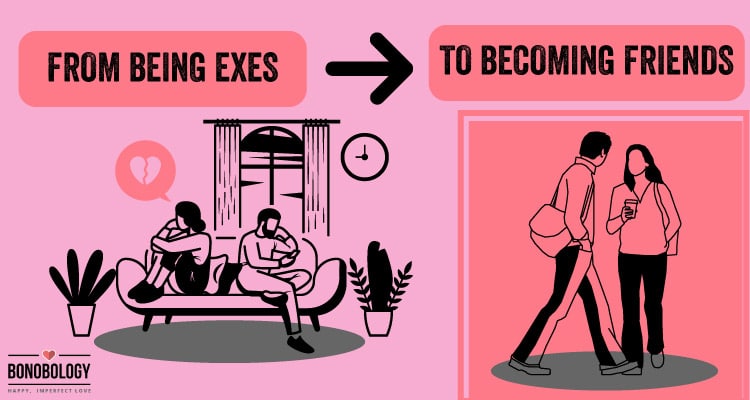Platonic relationships look good in stories, but do they find a space in the sexually awakened world? If rom-com scenarios and pop culture are to be believed, every romantic love story begins with a deeply loyal, platonic friendship. When every rom-com you see on the big screen screams that a platonic relationship will eventually turn into a romantic one, you begin to question if such a connection can ever truly last.
Before we get into any of that, it’s important to understand exactly what platonic relationships are, and if they are only limited to a same-sex bromance/womance, like the movies would have us believe. How are platonic and romantic relationships different, and what exactly is platonic love? To clear the myths, let’s explore the world of platonic relationships in detail.
What Are Platonic Relationships?
Table of Contents
Simple as it can be: A platonic relationship is a close bond between two individuals sans the sexual/romantic element. These individuals may also be in love but will not practice any sexual intimacy. Though the concept of platonic love very much exists, in the modern world, it centers heavily on the idea of two people being close friends. No matter where you are, a platonic relationship is synonymous with friendship.
According to the Merriam-Webster dictionary, the answer to the question, “What are platonic relationships?” is, “A close relationship between two persons in which sexual desire is nonexistent or has been suppressed or sublimated.” This definition introduces two schools of thought into the picture.
Some argue that when one (or both) individuals develop sexual intent toward the other (although it may be suppressed), the relationship cannot be considered a “pure” platonic relationship anymore, even though they are not sexually intimate in practice. The existence of intent is enough to discredit it as a platonic relationship.
On the other hand, most agree that until two people actually do engage in sexual activity, they’re still technically in a platonic relationship. At the end of the day, when you define platonic relationships, you say “people who share a close relationship but don’t have sex.”
Platonic love exists because the reasons why you love someone don’t have to involve sex. Love isn’t contingent on, sex isn’t always driven by love, is it? Named after the Greek philosopher Plato, this concept of platonic relationships is sourced from one of his writings in The Symposium. It explores numerous interpretations of love, be it a passionate sexual relationship, or a deep, healthy platonic love motivated by pure feelings toward each other.
Related Reading: Platonic Relationship Vs Romantic Relationship – Why Are Both Important?
Types Of Platonic Relationships
Now that you can define platonic relationships and know that it’s the complete opposite of being in a friends-with-benefits connection, it’d do you some good to learn about the types of platonic relationships, or rather, the terms that we largely associate with such a dynamic. Let’s take a look at a few of them:
- Queerplatonic relationships: A type of dynamic that features deeper commitment than just friendship but doesn’t involve any romantic or sexual feelings and is usually associated with the asexual and aromantic community. The difference between a queerplatonic relationship and a platonic relationship is that the latter is usually associated with close friendships, while the former can even be a framework for a long-term commitment or even co-parenting
- Bromance: A term used to describe a significantly close but non-romantic and non-sexual relationship between two men
- Womance: A significantly close relationship between two women but one that’s devoid of sexual intimacy and romantic feelings
- Work spouses: A term used to describe a work friend with whom a person shares a close connection with, but the sexual and romantic feelings are either non-existent or suppressed
In a nutshell, the above-listed types of relationships are the types of platonic relationships you’ll see most often. All of them share a considerable degree of mutual respect, emotional support, and a close relationship between two people. While we’re on the subject, let’s talk a little about a topic that usually confuses people: how are platonic and romantic relationships different?
Platonic relationships vs romantic relationships
Yes, both can share a certain amount of physical intimacy, but the biggest differentiation is the fact that platonic dynamics don’t go all the way if you know what we mean. The difference between such a dynamic and a romantic relationship is as follows:
| Platonic relationships | Romantic Relationships |
| A platonic relationship does not feature any form of sexual intimacy | Usually involve sex and physical intimacy |
| Though romantic feelings may exist in platonic love, they’re often suppressed or not “passionate” in nature | Be it sexual or romantic, both feelings exist and words like “passion” and “chemistry” are used to define it |
| Even if there is a desire for physical intimacy, it is often suppressed to keep it platonic | Sexual desire is a two-way street, and is often discussed and fulfilled |
| Often selfless, devoid of major expectations, and uncomplicated | Involves many expectations; more often than not, the success of a relationship hinges on the degree to which these expectations are met |
Benefits Of Platonic Relationships
If, by now, you’re wondering, “Do platonic relationships work?”, the answer to that question usually depends on the individuals involved in such an equation. Regardless of how well two people make it work, one thing’s for sure: there sure are a ton of benefits to such a dynamic. Let’s discuss a few of them, with some peer-reviewed studies to back us up:
- Helps you live longer: Believe it or not, a large 2010 study found that people with strong social relationships had a 50% more chance of living longer than those without them
- Improves your mental health: Strong, uncomplicated social connections reduce the risk of depression and anxiety, according to a study. Platonic connections can provide emotional support and validation, and help you keep your mental health in check
- Reduce stress: According to a study, having strong personal connections can help significantly reduce the feelings of stress a person faces
- Makes you emotionally strong: A study found that if a person has a strong support system and secure platonic connections with others, their likelihood of recovering from a traumatic or stressful event is much higher
- Grow as individuals: A support system with someone who wishes the best for you sans any ulterior motive is bound to have a positive effect on your growth
Of the many benefits we can think of, perhaps the ones listed above are the most significant. Like best buddies, both of you find peace and contentment in the company of each other. There are no demands or expectations, and you get full-time support in the best and the worst of times. A platonic relationship has no space for jealousy, complications, and insecurity.
Instead, you find that safe space with another human being where you can talk about anything you want. To top it all off, spending time with a platonic partner helps you keep your mental health in check too. However, there are far too many instances of platonic partners not being on the same page. Often, it turns into a one-sided relationship, or one person just starts expecting a lot more than they should. To make sure that doesn’t happen, it’s imperative to follow certain platonic relationship rules.
Related Reading: Can Men And Women Be Friends?
7 Platonic Relationship Rules
Platonic love can be very special for both the people involved. As a unique and rare bond, it may be prone to many societal judgments, which may cause problems and unwanted complications. Influenced by pop culture, this bond may succumb to twisted friendships, turning into a somewhat complicated relationship. But don’t worry, if you wish to stay in a healthy platonic relationship, here are some basic ground rules to keep in mind.
1. Nobody crosses the line
As a platonic relationship rule, neither of you should express sexual interest in the other. As a 3 AM buddy, you can support them in times of need. But that doesn’t mean you will take them for granted, or use them as a rebound. If you term your relationship as one that shares “platonic love”, you’ve got to keep it exactly like that. Platonic.
The same is applicable to what you say. While you can discuss any topic in the universe without any hesitation, including relationship problems, sexual conversations are best avoided, lest they make things complicated.
Related Reading: The 8 Types Of Love And What They Mean For You
2. Know your boundaries
Though friends don’t really have a conversation about “boundaries”, it’s pretty much understood that your dynamic will operate within the broad framework of how most friendships work. Don’t initiate or insinuate any sexual intimacy, no inappropriate touching, and if your platonic friend isn’t okay with sharing a bed at night, adhere to it.
Avoid any form of playful flattery, sexual remarks, or sending touchy-feely signals to a platonic partner. These mixed flirty signals harm personal dignity and breach platonic love, which you may never want. If you need help getting started, common boundaries in a relationship can also be applied in your platonic relationships.
3. If you want some change, be honest and courteous about it
Every relationship changes its form over time, and platonic friendships are no different. But, if you are vocal and honest about your changing needs, it may save you from lots of future complications. If you are interested in platonic dating and feel that your relationship has grown out of platonic commitment, talk it out.
Don’t fear the risk of losing your platonic partner. Instead, take a chance and put it out there. You never know, they may also be feeling the same way and you may decide to take your relationship to the next level. But if they don’t feel the same way and wish to keep it platonic, then you’ve got a decision to make. Can you suppress your feelings without experiencing any negative emotions?
Likewise, if you sense that your platonic friend is developing romantic feelings toward you, then bring it up politely and let them know where you stand on the issue. Talking it out will leave no one in doubt. Before you make a decision, understand the difference between platonic relationships vs romantic relationships.

4. Don’t break the trust
If s/he opens up a secret to you, don’t gossip about it. Breaking the trust will be the biggest relationship breach you can ever make. So, avoid discussing your private conversations with others, keep your word, and be there for your platonic friend when they need you.
Building trust in a relationship will only benefit the two of you and help you cultivate a dynamic that reaps all the benefits we spoke of earlier. A lasting friendship can be a beautiful thing, the kind where when you spend time with each other, you feel a certain sense of relaxation and satisfaction. To get there, you’ve both got to be able to trust each other completely.
5. Don’t be jealous of respective partners
Don’t turn a platonic friendship into a possessive love triangle, under the garb of “platonic love”. Don’t compare yourself with your friend’s partner, and definitely don’t go around feeling jealous of them. If you find yourself feeling excessively jealous of the sexual relationship or emotional connection that this person shares with their partner, perhaps you’ve got some thinking to do about how “suppressed” your romantic feelings are. Dealing with jealousy in a relationship takes some work. Try to not let it arise in the first place.

6. Don’t turn platonic love into an emotional affair
Many of us may confuse platonic friendship with a guilt-free emotional affair. But that is far from the truth. If your partner is not happy with your friendship, you have to make them believe that they have no reason to feel threatened by or insecure on account of your platonic relationship. Otherwise, this could have a toxic influence on your primary relationship.
Do not ever do anything that may hurt your partner or spouse, or make them question your romantic love toward them. Always keep it respectable. So, invest your energies wisely while handling both a romantic and a platonic relationship.
Related Reading: Inappropriate Friendships When Married – Here’s What You Should Know
7. Don’t treat it as an emotional dumping ground
If you are unhappy in your romantic relationship, don’t find a crying shoulder in your platonic friend. For one, this kind of emotional dumping may be unfair to your platonic friend. Besides, it won’t help solve the issues between you and your significant other. Sure, you can reach out to your friend for counsel or advice now and then, but don’t make it a habit of discussing every little detail of your relationship with them.
When you do that, you’re merely triangulating in a bid to seek validation for your actions, and that never serves any purpose. Talk to your partner and resolve the issues amicably. Respecting your relationship is important. Don’t invest more in your platonic friends than your partner. You also shouldn’t discuss the intimate details of your relationship with a platonic friend.
Key Pointers
- A platonic relationship is a close relationship between two people that is devoid of sexual intimacy and romantic feelings or at least suppresses the sexual and romantic feelings
- Such relationships have a lot of benefits, including mental & physical health benefits
- To keep a dynamic platonic, individuals must follow basic guidelines which include: not overtly flirting, not making things awkward with sexual advances
So, do platonic relationships work, and are they worth it? If you’ve been paying attention, you know by now that they sure do work and that the benefits of a strong connection such as this definitely outweigh the negatives, if there even are any. Take this as a sign to get out there and make some new friends, or just reconnect with some old ones.
This article has been updated in Feb 2023.
11 Examples Of Self-Sabotaging Behaviors That Ruin Relationships
What Are The Stages Of An Emotional Affair? You May Be Inching Toward One…
Your contribution does not constitute a charitable donation. It will allow Bonobology to continue bringing you new and up-to-date information in our pursuit of helping anyone in the world to learn how to do anything.























Featured
How to Tell Someone You Just Want to Be Friends: 15 Examples
15 Best Apps to Make Friends
Platonic Crush — Meaning, Signs, And What To Do
Maid of Honor Duties Explained: The Ultimate To-Do List
21 Fun Bachelorette Party Games To Amp Up The Naughty Quotient
Casual Dating Vs. Friends With Benefits – 10 Key Differences
Falling In Love With A Friend – What Next?
15 Crucial Boundaries For Being Friends With An Ex
15 Boyfriend-Female Friends Boundaries To Swear By
Everything On How To Be Friends With Your Ex
18 Friends-With-Benefits Rules To Swear By
20 Signs He Wants To Be More Than Friends
15 Signs He Cares More Than You Think
Does She Like Me More Than A Friend – Solving The Dilemma
15 Types Of Situationships And Their Signs
How To Get Someone To Stop Texting You Without Being Rude
Platonic Soulmate: What Is It And 11 Signs You’ve Found Yours
Toxic Masculinity And Homophobia Within Male Friendships
How To Get Over A Friendship Breakup
What Do Guys Think Of Their Female Friends?